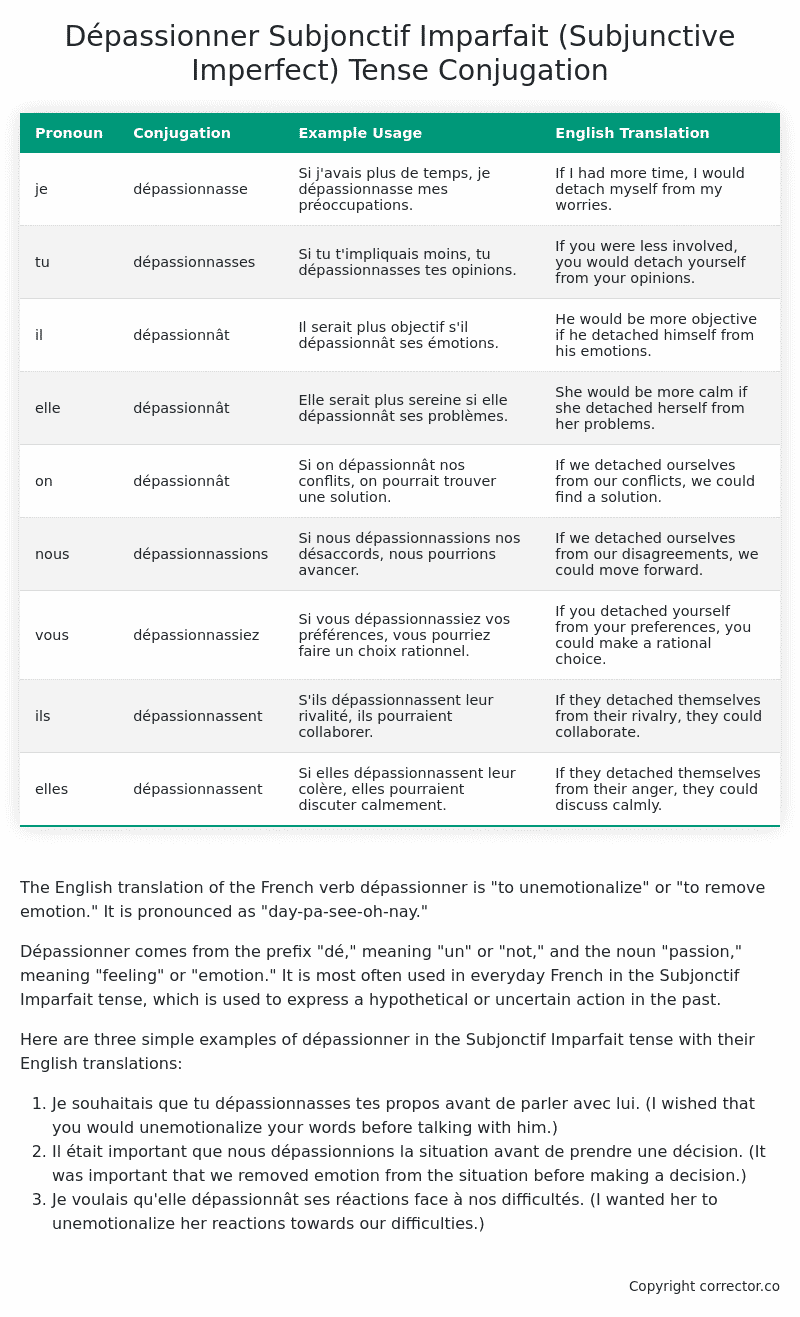Subjonctif Imparfait (Subjunctive Imperfect) Tense Conjugation of the French Verb dépassionner
Introduction to the verb dépassionner
The English translation of the French verb dépassionner is “to unemotionalize” or “to remove emotion.” It is pronounced as “day-pa-see-oh-nay.”
Dépassionner comes from the prefix “dé,” meaning “un” or “not,” and the noun “passion,” meaning “feeling” or “emotion.” It is most often used in everyday French in the Subjonctif Imparfait tense, which is used to express a hypothetical or uncertain action in the past.
Here are three simple examples of dépassionner in the Subjonctif Imparfait tense with their English translations:
- Je souhaitais que tu dépassionnasses tes propos avant de parler avec lui. (I wished that you would unemotionalize your words before talking with him.)
- Il était important que nous dépassionnions la situation avant de prendre une décision. (It was important that we removed emotion from the situation before making a decision.)
- Je voulais qu’elle dépassionnât ses réactions face à nos difficultés. (I wanted her to unemotionalize her reactions towards our difficulties.)
Table of the Subjonctif Imparfait (Subjunctive Imperfect) Tense Conjugation of dépassionner
| Pronoun | Conjugation | Example Usage | English Translation |
|---|---|---|---|
| je | dépassionnasse | Si j’avais plus de temps, je dépassionnasse mes préoccupations. | If I had more time, I would detach myself from my worries. |
| tu | dépassionnasses | Si tu t’impliquais moins, tu dépassionnasses tes opinions. | If you were less involved, you would detach yourself from your opinions. |
| il | dépassionnât | Il serait plus objectif s’il dépassionnât ses émotions. | He would be more objective if he detached himself from his emotions. |
| elle | dépassionnât | Elle serait plus sereine si elle dépassionnât ses problèmes. | She would be more calm if she detached herself from her problems. |
| on | dépassionnât | Si on dépassionnât nos conflits, on pourrait trouver une solution. | If we detached ourselves from our conflicts, we could find a solution. |
| nous | dépassionnassions | Si nous dépassionnassions nos désaccords, nous pourrions avancer. | If we detached ourselves from our disagreements, we could move forward. |
| vous | dépassionnassiez | Si vous dépassionnassiez vos préférences, vous pourriez faire un choix rationnel. | If you detached yourself from your preferences, you could make a rational choice. |
| ils | dépassionnassent | S’ils dépassionnassent leur rivalité, ils pourraient collaborer. | If they detached themselves from their rivalry, they could collaborate. |
| elles | dépassionnassent | Si elles dépassionnassent leur colère, elles pourraient discuter calmement. | If they detached themselves from their anger, they could discuss calmly. |
Other Conjugations for Dépassionner.
Le Present (Present Tense) Conjugation of the French Verb dépassionner
Imparfait (Imperfect) Tense Conjugation of the French Verb dépassionner
Passé Simple (Simple Past) Tense Conjugation of the French Verb dépassionner
Passé Composé (Present Perfect) Tense Conjugation of the French Verb dépassionner
Futur Simple (Simple Future) Tense Conjugation of the French Verb dépassionner
Futur Proche (Near Future) Tense Conjugation of the French Verb dépassionner
Plus-que-parfait (Pluperfect) Tense Conjugation of the French Verb dépassionner
Passé Antérieur (Past Anterior) Tense Conjugation of the French Verb dépassionner
Futur Antérieur (Future Anterior) Tense Conjugation of the French Verb dépassionner
Subjonctif Présent (Subjunctive Present) Tense Conjugation of the French Verb dépassionner
Subjonctif Passé (Subjunctive Past) Tense Conjugation of the French Verb dépassionner
Subjonctif Imparfait (Subjunctive Imperfect) Tense Conjugation of the French Verb dépassionner (this article)
Conditionnel Présent (Conditional Present) Tense Conjugation of the French Verb dépassionner
Conditionnel Passé (Conditional Past) Tense Conjugation of the French Verb dépassionner
L’impératif Présent (Imperative Present) Tense Conjugation of the French Verb dépassionner
L’infinitif Présent (Infinitive Present) Tense Conjugation of the French Verb dépassionner
Struggling with French verbs or the language in general? Why not use our free French Grammar Checker – no registration required!
Get a FREE Download Study Sheet of this Conjugation 🔥
Simply right click the image below, click “save image” and get your free reference for the dépassionner Subjonctif Imparfait tense conjugation!

Dépassionner – About the French Subjonctif Imparfait (Subjunctive Imperfect) Tense
Formation
Common Everyday Usage Patterns
Interactions with Other Tenses
Subjonctif Présent
Indicatif Passé Composé
Conditional
Conditional Perfect
Summary
I hope you enjoyed this article on the verb dépassionner. Still in a learning mood? Check out another TOTALLY random French verb conjugation!


